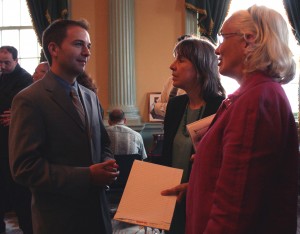
- Photo by Andrew Firestone
Somerville pol: ‘Corruption’ tainted process
*
Somerville legislators who oppose bringing casinos to Massachusetts scored an indirect victory last week after Gov. Deval Patrick said he would veto the most recent bill approved by both the house and the senate.
State representatives Denise Provost and Carl Sciortino and state Senator Pat Jehlen opposed a plan to build three casinos and two slot parlors for racing tracks – in part because of a no-bid licensing plan for the race tracks.
“I think it is a corruption of public process for private profit,” Sciortino said of gaming lobbyists and the legislative process surrounding the issue.
Gaming lobbyists spent $1.8 million in the first half of 2010.
Patrick’s veto ends discussion of the matter until January, when the house is in session again.
Provost, D-Somerville, said that the State’s Inspector General had recently ruled that allowing the tracks to automatically have licenses for slots would violate public bid laws, as it results in no bid-licenses.
Sciortino said he was “extremely disappointed in the legislature for the actions around casinos.”
“In this case I think we are doing the bidding of an industry that has profit as its motive [and] destruction of peoples lives through addiction as their primary product,” he said. “[The gaming bill] is being negotiated behind closed doors without access from the public. I think it’s a shame.”
On the other side of the issue, State Representative Tim Toomey Jr. (D-Somerville amd Cambridge) voiced support for expanded gaming. “That’s been since I was first elected. I think I’ve been pretty consistent,” he said.
“I’m not a big fan of the racinos,” Toomey said. “It’s part of the bill. Most bills you’re not one hundred percent happy with when they come out.” Of the racinos he said, “How they came to that, I don’t really know.”
Provost was critical of the slot parlor licenses that would go to the racetracks. “Addictions of various kinds are a problem all over the state and slot machines are designed to be particularly addictive,” she said.
Calling the bill a “huge mistake” Sciortino said he believed whatever the windfall in revenue from casinos would offset by the social costs of “bankruptcy, foreclosure, divorce and crime” associated with areas within a 50 mile radius of the proposed casinos.
Jehlen (D-Somerville) said debt and poverty through gambling is so commonplace that Connecticut bankruptcy lawyers referred to the situation as the “Foxwoods Defense.”
“We are not immune to those problems in Somerville and Medford because the casino would be opened a few miles away,” Sciortino said. “People can say all they want about people travelling to Connecticut, but the reality is having to travel somewhat farther away reduces the likelihood of people actually going on a regular basis, blowing their whole paycheck and destroying their families.”
Multiple casinos in the state also raised objections from Provost and Jehlen.
Adding to the three resort casinos would be at least one Wampanoag resort casino. Native American tribes do not have to be licensed by the state; they are allowed to build whatever gaming facilities are legal in the state under the Indian Gaming Regulatory Act.
Provost pointed to Florida as an example of the plight of existing tracks competing against Indian casinos. “[Seminole] casinos have created so much competition for the race tracks, so of course now the race tracks are crying and screaming that they need more from the state.”
A report by the New Hampshire Gaming Commission predicted that Massachusetts gaming would take away $76 million a year in hospitality and meal taxes from New Hampshire, leading to a speculation that Governor John Lynch might push to have a new casino built near the border.
The state lottery would have lost $144 million of its $950 million annual contribution to the state – of which $14 million goes to Somerville city aid. “This is real money we’re talking about here,” said Provost who said the lottery serves as consistent revenue for the state, even in times of economic recession. “depending on bond rates… some 21 to 26 cents of every dollar gambled comes back to Massachusetts.”
Toomey said there was little difference between lottery and expanded gambling philosophically. “You go to a lot of these corner stores, they’re little casinos right now,” he said. “They have KENO. They have the horse-racing on screen. At some places they have chairs for people to sit, and they play there all day long The state is…already taxing some form of casino betting with that.”
Toomey said he expects the issue to be raised again in January.
“There’ll be new members come January. The whole dynamic can change, there might be a majority that doesn’t favor casinos,” he said. “I can’t predict what’s going to happen in January that’s for sure. It’s an interesting little showdown that’s coming.”















Reader Comments